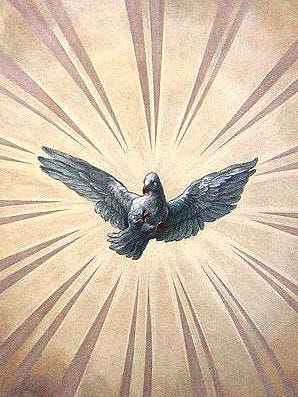
Then there appeared to them divided tongues, as of fire, and one sat upon each of them. And they were all filled with the Holy Spirit and began to speak with other tongues, as the Spirit gave them utterance.
Acts 2:3-4, NKJV
In the first and second chapter of Acts of the Apostles—in the wake of an execution, resurrection, and ascension—we find the early Jesus movement in a state of dazed formation. They have stopped looking to the sky and started organizing themselves, walking slowly to Jerusalem, picking leaders, and beginning to discuss what it might mean to be a witness to the resurrection.
There is both a chaos and a clarity to beginnings. The motivation and inspiration—in this case, to tell the story of Jesus’ life and resurrection—will perhaps never be clearer than at the beginning. But the ‘how’ of it all eludes. Suddenly, one gets bogged down in the minutia of organizing. Who will lead? What does it mean to lead? How will the message remain as crystal-clear as it is right now? Will power corrupt the truth of our moment? Will our baser instincts win out in spite of ourselves?
Today, as debates and accusations over Israel and Palestine, the November elections here in the US, and the role of politics and law enforcement abound, we see another moment of chaos and clarity. It’s so natural to get caught up in the jumble of discourse and disagreement, manufactured distractions from the central calls of student. But in the midst of the mess, the crystal-clear truth still abides: that the subjugation of the Palestinian people must end.
It is a bitter irony that today is the day I’m talking about the Pentecost, when tongues of a very different kind of fire have claimed the lives of children, parents, aunts, and uncles in Rafah. I hesitate to take any meaning out of this moment, to say anything about it other than to express profound and utter shock, rage, and humiliation at this nation’s complicity. But there is one parallel from the Pentecost of Acts. After the moment had passed and everyone had heard one another, all the people were “cut to the heart” by the distilled truth of the moment (2:37). I wish for us that same moment of clarity. I wish for all of us the presence of the Holy Spirit’s wisdom in our movements and actions this week: Come, Holy Spirit. The world needs you.
Suggestions for Centering Practices
Donate to this Gofundme for the Murtaja family in Gaza. This Gofundme has been vetted by a trusted activist I follow.
Consider using the prayer of the Holy Spirit (it comes from the Pentecost liturgy) with a focus on the feminine divine. Rethink your understanding of the holy spirit. Dwell on it and contemplate it. What new meaning does it have for you?
Come, Holy Spirit, fill the hearts of your faithful
and kindle in them the fire of your love.
Send forth your Spirit and they shall be created,
and you shall renew the face of the earth.O God, who have taught the hearts of the faithful
by the light of the Holy Spirit,
grant that in the same Spirit we may be truly wise
and ever rejoice in [her] consolation.Call your representatives to ask for an immediate and permanent ceasefire in Gaza.
Resources, Sacred and Secular, to Take You Deeper in this Season
Prayers to Sophia: Deepening our Relationship to Holy Wisdom by Joyce Rupp
The Forgotten Desert Mothers: Sayings, Lives, and Stories of Early Christian Women by Laura Swan
Resistance by Barry Lopez
“Hymnus: Veni Creator Spiritus” from Symphony No. 8 by Gustav Mahler



Hi Rebecca--nice job connecting the Acts chapter with Palestinians (and others). It fits well at this moment. Also, have you ever read "Meeting Jesus Again for the First Time" by Marcus Borg? It has a whole chapter on Sophia and how/where she fits into Christianity.